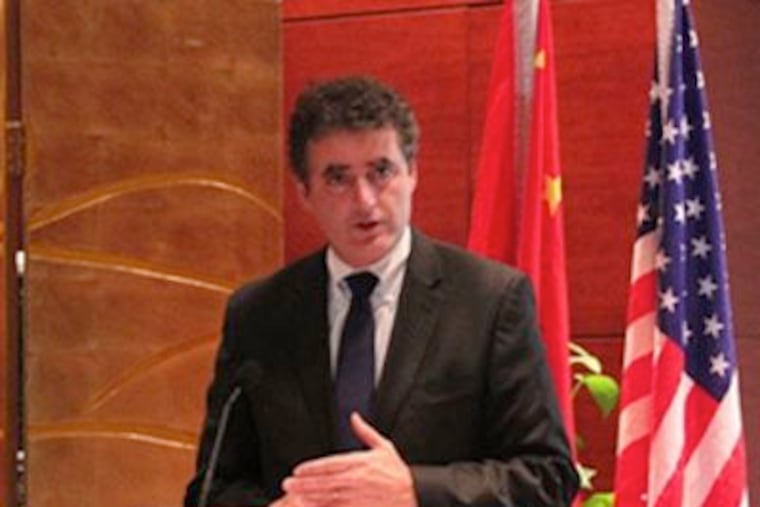China trip sought backing for Bucks highway project
U.S. Rep. Mike Fitzpatrick (R., Pa.) and Pasquale T. "Pat" Deon Sr., chairman of the SEPTA board and a commissioner of the Pennsylvania Turnpike Commission, made a private trip to China last month to urge wealthy Chinese to immigrate to the United States by investing in a major highway construction project in Bucks County.

U.S. Rep. Mike Fitzpatrick (R., Pa.) and Pasquale T. "Pat" Deon Sr., chairman of the SEPTA board and a commissioner of the Pennsylvania Turnpike Commission, made a private trip to China last month to urge wealthy Chinese to immigrate to the United States by investing in a major highway construction project in Bucks County.
Fitzpatrick and Deon met with about 250 potential investor-immigrants in Beijing and Shanghai.
Fitzpatrick paid for the cost of the trip for himself and his son with campaign funds, his chief of staff, Athan Koutsiouroumbas, said Wednesday.
"The travel of Mr. Fitzpatrick and his son were covered by his candidate committee in support of his official duties, and not at taxpayer expense," Koutsiouroumbas said.
He said he did not know the cost of the trip but would make that information available after examining expense records.
Deon, a Republican power broker and Bucks County restaurateur and beer distributor, said he paid for the cost of the trip for himself and his daughter. He would not say how much it cost.
The Federal Election Commission has ruled that campaign funds may be used for "travel expenses for a federal officeholder and his or her accompanying spouse and children, provided that the travel is undertaken to participate in a function that is directly connected to the officeholder's bona fide official responsibilities."
The officials, who made the unannounced trip three days after Fitzpatrick's reelection to Congress on Nov. 4, combined their investment pitches with sightseeing trips to the Great Wall and other attractions.
The Turnpike Commission plans to use $200 million from foreign investors to help pay for the $420 million connection between I-95 and the Pennsylvania Turnpike in Bristol Township.
The financing plan allows the investors to get U.S. residency for themselves and their families by contributing $500,000 each to a job-creating project in the United States, under the federal Immigrant Investor Program, created in 1990. Successful investors will be eligible for EB-5 immigration visas and a path to eventual U.S. citizenship.
Each foreign investor in the turnpike project also is paying $50,000 to the deal-makers and $15,000 to the attorneys involved.
"Building the I-95 interchange will create thousands of jobs while completing a project decades overdue," Fitzpatrick said in a statement. "I made the trip so that I could better understand those who might want to invest in the project."
Deon said the officials found "a lot of interest in America. . . . They want to get a better life for their kids."
"That's the kind of people we want over here."
Deon brought the EB-5 financing proposal to the Turnpike Commission in 2012 after SEPTA made a similar deal to borrow $175 million to pay for its smart-card fare-payment system in 2011.
Turnpike officials say they expect the deal to save the agency about $35 million in borrowing costs over five years.
It was put together by several officials of the Swarthmore Group, a Philadelphia investment-management firm headed by James E. Nevels, a prominent Republican donor and fund-raiser.
The financiers created a separate company, the Delaware Valley Regional Center, to handle the deal. The Swarthmore Group is not involved in the transaction.
Videos of Fitzpatrick and Deon, posted on the promoter's Chinese-language website, show the two officials describing the highway project at the Beijing Grand Millennium Hotel and the Shanghai Portman Ritz-Carlton Hotel.
"We're very excited about this long-awaited highway construction project and the use of lower-cost EB-5 financing," Fitzpatrick told the potential investors. "Pennsylvania was one of the first states in the nation to use EB-5 financing, which remains a strong investment opportunity. I just want to say we appreciate your interest in the project, it's an important project for our region and our nation."
Deon told the Chinese investors that the Turnpike Commission envisions using similar cash-for-residency funds for future projects.
The commission is "very interested in moving forward with more of this type of financing," he said.
The first $50 million installment from the foreign investors is due to be paid to the Turnpike Commission by April.
Construction began in October on the long-awaited direct connection between I-95 and the turnpike.
PKF-Mark III Inc. of Newtown won the contract to build the first section of the $420 million Stage 1 of the new interchange, which will finally provide an unbroken I-95 between Maine and Florida. For decades, I-95 has been incomplete in New Jersey near Trenton.
When Stage 1 is completed in 2018, I-95 will be rerouted onto the Pennsylvania Turnpike east of the connection and then onto the New Jersey Turnpike. The current I-95 north of the connection will be redesignated as I-395 or I-195.
Since I-95 was built through Bucks County in 1969, crossing the turnpike, truckers and motorists have complained about the lack of a direct link between the two superhighways. Drivers must exit to local roads and then get on the adjoining highway.
That was the result of a federal prohibition at the time on using federal highway money for toll roads, such as the turnpike.
But even with the completion of Stage 1, the only direct connections will be from the westbound turnpike to southbound I-95 and from northbound I-95 to the eastbound turnpike.
All other direct connections will have to wait for the still-unfunded Stage 2, expected to cost about $600 million and to begin construction in 2020.
215-854-4587
@nussbaumpaul